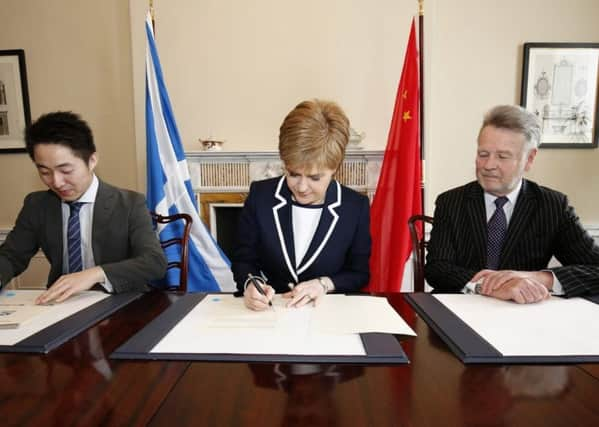Willie Rennie: Still no response on how to avoid another SNP '˜shambles'


Scottish first ministers’ journeys abroad have historically been something of a mixed bag. For every trade opportunity unlocked there’s been a misstep.
Alex Salmond admitted buying £260 tartan trews on the public purse whilst in China. Sturgeon couldn’t help but use her trip to California last year to make the case for independence. But on this trip the First Minister has a reputation to repair because of something that took place much closer to home. In Bute House to be precise.
Advertisement
Hide AdAdvertisement
Hide AdIn June 2016 the First Minister signed an agreement reportedly worth £10 billion with a pair of Chinese firms. Unfortunately, the government had not done the most basic of checks.
So we did. It swiftly became apparent that one of the firms had connections to human rights abuses. Condemned by Amnesty International, it was also wholly owned by a company blacklisted by the Norwegian Oil Fund for fear of gross corruption.
The other company’s modus operandi was to generate a cloud of publicity in one part of the country to build credibility towards signing a deal in another. The First Minister’s signature and photo was gained on the basis of a series of rumours of investment elsewhere, from theme parks to power stations.
The photograph of her putting pen to paper was then used to give credibility to the next “investment” – this time in Liverpool Football Club. The problem was the company didn’t have any money to spend. The Scottish Government was part of that sham because it had not bothered to check.
Sturgeon was duped by men in sharp suits.
The man who fixed the deal later admitted it was “all b****cks”. But, even now, the First Minister won’t admit it.
This series of events became known in China as the “Scottish shambles”.
As it wound to a close, under pressure from human rights activists, Scottish Liberal Democrats and the media, the Economy Secretary stood up in parliament and promised that changes would be made.
It’s now over a year since Keith Brown said that he would work to develop a “robust human rights impact assessment” process to vet companies the government was considering dealing with. Yet, when I pressed Sturgeon about this at FMQs, she was unable to say when this would be published or what checks had been done on the firms she is set to meet this week.
Advertisement
Hide AdAdvertisement
Hide AdScotland’s reputation for good business was dented in China by the so-called Scottish shambles. We need to know what checks have been done on the companies the First Minister is set to deal with this time and how they fared. Are they fit and proper partners for the Scottish Government?
It is not “talking Scotland down” to question whether the companies that the Scottish Government chooses to do business with have been blacklisted or condemned by international organisations.
When the First Minister goes to China she also has an opportunity to raise the cases of imprisoned Tibetan language rights advocate Tashi Wangchuk, jailed lawyer Jiang Tianyong and human rights activist Wang Quanzhang, detained by police and not seen since August 2015. These are issues that no-one who claims to stand up for human rights can shy away from.
I want Scotland to play a positive role in the world. That means we need to be an outward-looking trading nation.
But it also requires Scottish ministers to be switched on to who precisely they are dealing with.
Willie Rennie is leader of the Scottish Liberal Democrats